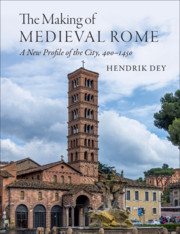Book contents
- The Making of Medieval Rome
- The Making of Medieval Rome
- Copyright page
- Contents
- Preface
- Introduction
- Chapter 1 The Eternal City on the Brink
- Chapter 2 401–552
- Chapter 3 552–705
- Chapter 4 705–882
- Chapter 5 The Long Twilight of the Early Middle Ages
- Chapter 6 1046–1230
- Chapter 7 1230–1420
- Epilogue
- Notes
- References
- Index
Chapter 7 - 1230–1420
Barons, Babylonian Captivity, and Black Death: The Apogee and Agony of Late Medieval Rome
Published online by Cambridge University Press: 30 September 2021
- The Making of Medieval Rome
- The Making of Medieval Rome
- Copyright page
- Contents
- Preface
- Introduction
- Chapter 1 The Eternal City on the Brink
- Chapter 2 401–552
- Chapter 3 552–705
- Chapter 4 705–882
- Chapter 5 The Long Twilight of the Early Middle Ages
- Chapter 6 1046–1230
- Chapter 7 1230–1420
- Epilogue
- Notes
- References
- Index
Summary
There is substantial consensus that the years around 1230 represent a sociopolitical inflection point at Rome, when the “barons” began definitively to surpass the rest of the urban nobility and constitute themselves as a class apart – the barones Urbis as opposed to the ordinary nobiles Urbis. This local superelite, never exceeding 12–15 families, would exercise “a crushing hegemony over Roman political life” for more than a century, until the popular backlash that crystallized around Cola di Rienzo in 1347. Even then, their eclipse was temporary. Across the period c. 1230–1420, the barons were the most consistently influential actors on the Roman stage. Whether as cardinals (and sometimes popes), senators, or ‘private’ agents, they would play an outsized role in shaping – for better and for worse – the urban environment for the rest of the Middle Ages: for better, in that baronial patrons sponsored a preponderance of the most impressive monuments and artistic commissions attempted in Rome; for worse, in that they subverted the mechanisms of communal government and made Rome the arena for their bloody rivalries.
- Type
- Chapter
- Information
- The Making of Medieval RomeA New Profile of the City, 400 – 1420, pp. 214 - 254Publisher: Cambridge University PressPrint publication year: 2021



